ENV7097 Essay: Neoliberalism, Planning, and Queensland Context
VerifiedAdded on 2023/04/25
|10
|2268
|275
Essay
AI Summary
This essay examines the influence of neoliberalism on urban planning in Queensland, Australia, within the context of 21st-century socio-economic policies. It defines neoliberalism as a modified version of liberalism that incorporates socio-economic concerns into public policy and development models. The essay analyzes how neoliberalism, particularly through citizen engagement and dialogue, has shaped Queensland's development, focusing on the Liberal National Party's governance post-2012. It critiques Brian W. Head's perspective on community engagement and participation, linking it to Queensland's planning system. The analysis identifies shortcomings in the implementation of neoliberal policies, such as reduced communication between local authorities and individuals, and the informal nature of networked arrangements. The essay argues that the dynamism of change and the privatization of government assets present challenges to the sustainability of Queensland's development plans, particularly concerning the reinvestment of profits for community welfare. Desklib provides a platform to access this essay and many other resources.

Paraphrase This Document
Need a fresh take? Get an instant paraphrase of this document with our AI Paraphraser
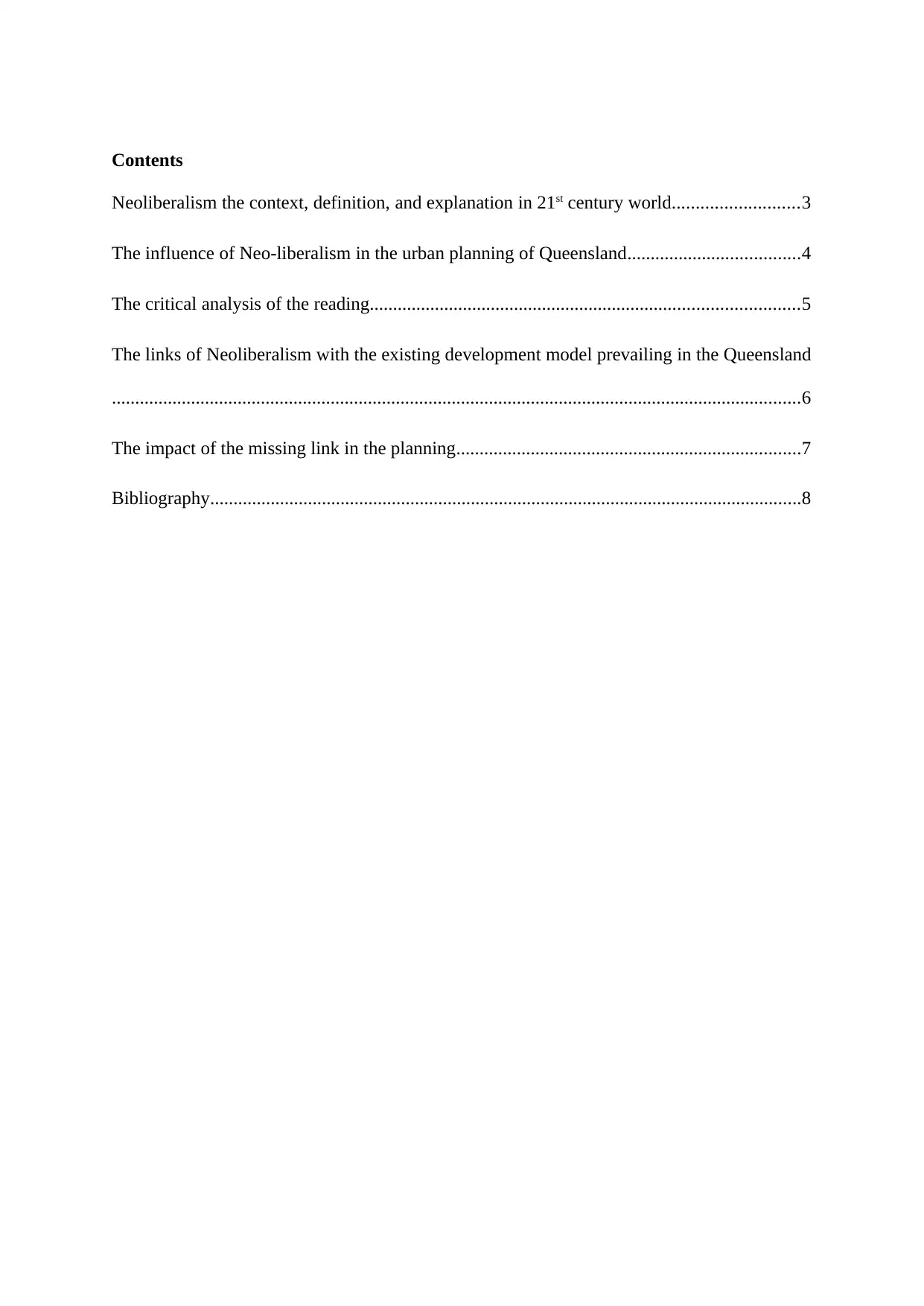
Contents
Neoliberalism the context, definition, and explanation in 21st century world...........................3
The influence of Neo-liberalism in the urban planning of Queensland.....................................4
The critical analysis of the reading............................................................................................5
The links of Neoliberalism with the existing development model prevailing in the Queensland
....................................................................................................................................................6
The impact of the missing link in the planning..........................................................................7
Bibliography...............................................................................................................................8
Neoliberalism the context, definition, and explanation in 21st century world...........................3
The influence of Neo-liberalism in the urban planning of Queensland.....................................4
The critical analysis of the reading............................................................................................5
The links of Neoliberalism with the existing development model prevailing in the Queensland
....................................................................................................................................................6
The impact of the missing link in the planning..........................................................................7
Bibliography...............................................................................................................................8
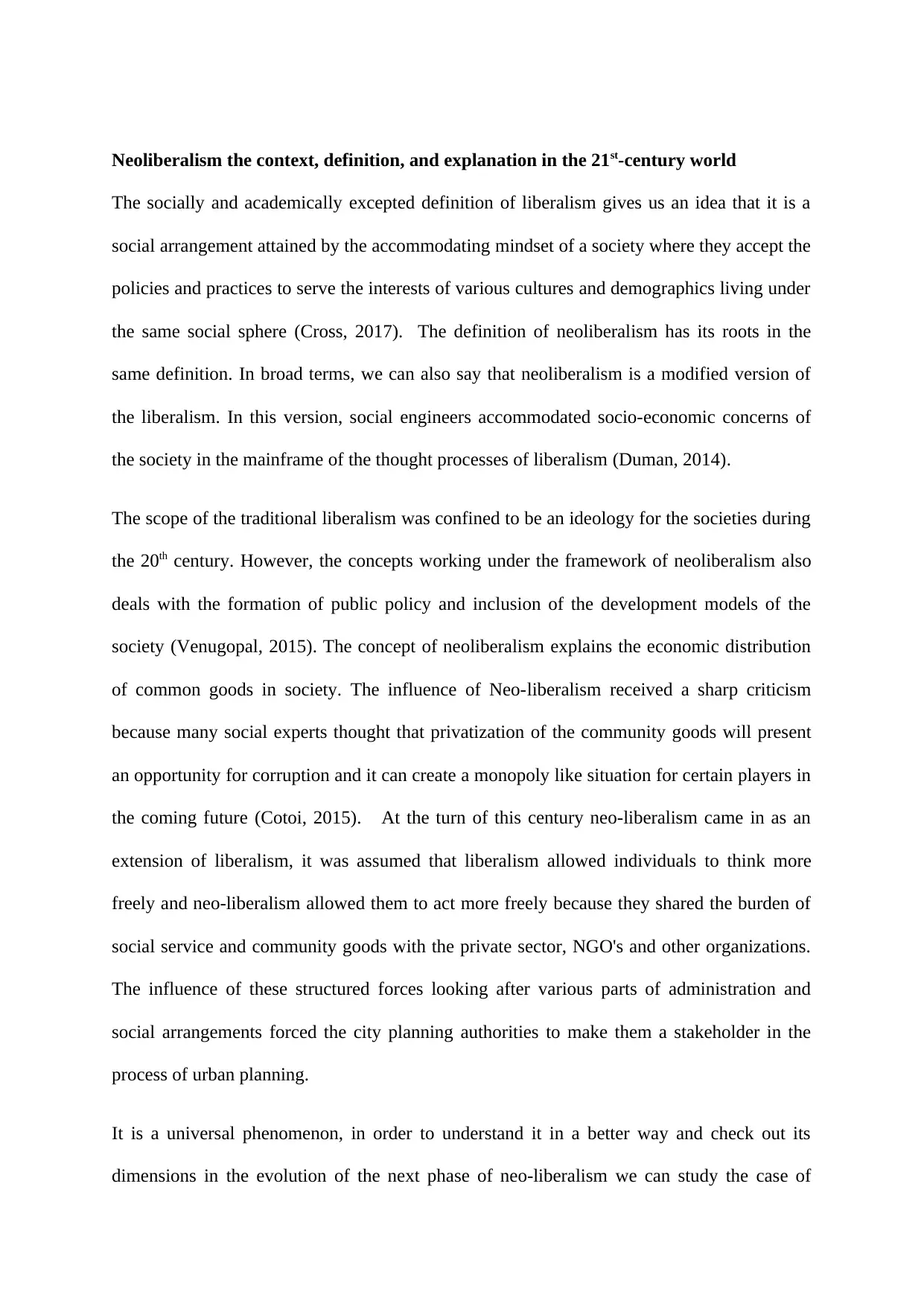
Neoliberalism the context, definition, and explanation in the 21st-century world
The socially and academically excepted definition of liberalism gives us an idea that it is a
social arrangement attained by the accommodating mindset of a society where they accept the
policies and practices to serve the interests of various cultures and demographics living under
the same social sphere (Cross, 2017). The definition of neoliberalism has its roots in the
same definition. In broad terms, we can also say that neoliberalism is a modified version of
the liberalism. In this version, social engineers accommodated socio-economic concerns of
the society in the mainframe of the thought processes of liberalism (Duman, 2014).
The scope of the traditional liberalism was confined to be an ideology for the societies during
the 20th century. However, the concepts working under the framework of neoliberalism also
deals with the formation of public policy and inclusion of the development models of the
society (Venugopal, 2015). The concept of neoliberalism explains the economic distribution
of common goods in society. The influence of Neo-liberalism received a sharp criticism
because many social experts thought that privatization of the community goods will present
an opportunity for corruption and it can create a monopoly like situation for certain players in
the coming future (Cotoi, 2015). At the turn of this century neo-liberalism came in as an
extension of liberalism, it was assumed that liberalism allowed individuals to think more
freely and neo-liberalism allowed them to act more freely because they shared the burden of
social service and community goods with the private sector, NGO's and other organizations.
The influence of these structured forces looking after various parts of administration and
social arrangements forced the city planning authorities to make them a stakeholder in the
process of urban planning.
It is a universal phenomenon, in order to understand it in a better way and check out its
dimensions in the evolution of the next phase of neo-liberalism we can study the case of
The socially and academically excepted definition of liberalism gives us an idea that it is a
social arrangement attained by the accommodating mindset of a society where they accept the
policies and practices to serve the interests of various cultures and demographics living under
the same social sphere (Cross, 2017). The definition of neoliberalism has its roots in the
same definition. In broad terms, we can also say that neoliberalism is a modified version of
the liberalism. In this version, social engineers accommodated socio-economic concerns of
the society in the mainframe of the thought processes of liberalism (Duman, 2014).
The scope of the traditional liberalism was confined to be an ideology for the societies during
the 20th century. However, the concepts working under the framework of neoliberalism also
deals with the formation of public policy and inclusion of the development models of the
society (Venugopal, 2015). The concept of neoliberalism explains the economic distribution
of common goods in society. The influence of Neo-liberalism received a sharp criticism
because many social experts thought that privatization of the community goods will present
an opportunity for corruption and it can create a monopoly like situation for certain players in
the coming future (Cotoi, 2015). At the turn of this century neo-liberalism came in as an
extension of liberalism, it was assumed that liberalism allowed individuals to think more
freely and neo-liberalism allowed them to act more freely because they shared the burden of
social service and community goods with the private sector, NGO's and other organizations.
The influence of these structured forces looking after various parts of administration and
social arrangements forced the city planning authorities to make them a stakeholder in the
process of urban planning.
It is a universal phenomenon, in order to understand it in a better way and check out its
dimensions in the evolution of the next phase of neo-liberalism we can study the case of
⊘ This is a preview!⊘
Do you want full access?
Subscribe today to unlock all pages.

Trusted by 1+ million students worldwide
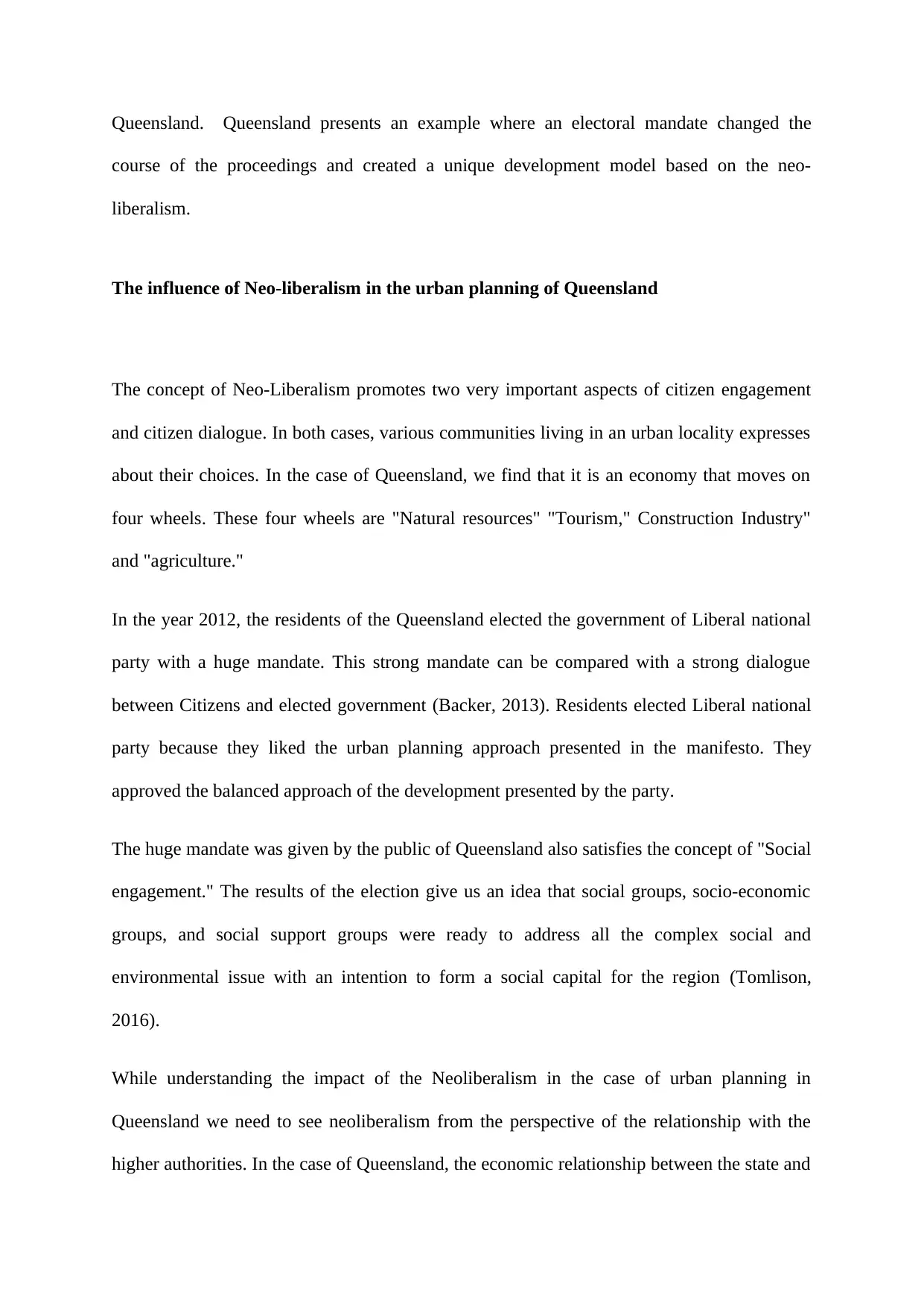
Queensland. Queensland presents an example where an electoral mandate changed the
course of the proceedings and created a unique development model based on the neo-
liberalism.
The influence of Neo-liberalism in the urban planning of Queensland
The concept of Neo-Liberalism promotes two very important aspects of citizen engagement
and citizen dialogue. In both cases, various communities living in an urban locality expresses
about their choices. In the case of Queensland, we find that it is an economy that moves on
four wheels. These four wheels are "Natural resources" "Tourism," Construction Industry"
and "agriculture."
In the year 2012, the residents of the Queensland elected the government of Liberal national
party with a huge mandate. This strong mandate can be compared with a strong dialogue
between Citizens and elected government (Backer, 2013). Residents elected Liberal national
party because they liked the urban planning approach presented in the manifesto. They
approved the balanced approach of the development presented by the party.
The huge mandate was given by the public of Queensland also satisfies the concept of "Social
engagement." The results of the election give us an idea that social groups, socio-economic
groups, and social support groups were ready to address all the complex social and
environmental issue with an intention to form a social capital for the region (Tomlison,
2016).
While understanding the impact of the Neoliberalism in the case of urban planning in
Queensland we need to see neoliberalism from the perspective of the relationship with the
higher authorities. In the case of Queensland, the economic relationship between the state and
course of the proceedings and created a unique development model based on the neo-
liberalism.
The influence of Neo-liberalism in the urban planning of Queensland
The concept of Neo-Liberalism promotes two very important aspects of citizen engagement
and citizen dialogue. In both cases, various communities living in an urban locality expresses
about their choices. In the case of Queensland, we find that it is an economy that moves on
four wheels. These four wheels are "Natural resources" "Tourism," Construction Industry"
and "agriculture."
In the year 2012, the residents of the Queensland elected the government of Liberal national
party with a huge mandate. This strong mandate can be compared with a strong dialogue
between Citizens and elected government (Backer, 2013). Residents elected Liberal national
party because they liked the urban planning approach presented in the manifesto. They
approved the balanced approach of the development presented by the party.
The huge mandate was given by the public of Queensland also satisfies the concept of "Social
engagement." The results of the election give us an idea that social groups, socio-economic
groups, and social support groups were ready to address all the complex social and
environmental issue with an intention to form a social capital for the region (Tomlison,
2016).
While understanding the impact of the Neoliberalism in the case of urban planning in
Queensland we need to see neoliberalism from the perspective of the relationship with the
higher authorities. In the case of Queensland, the economic relationship between the state and
Paraphrase This Document
Need a fresh take? Get an instant paraphrase of this document with our AI Paraphraser
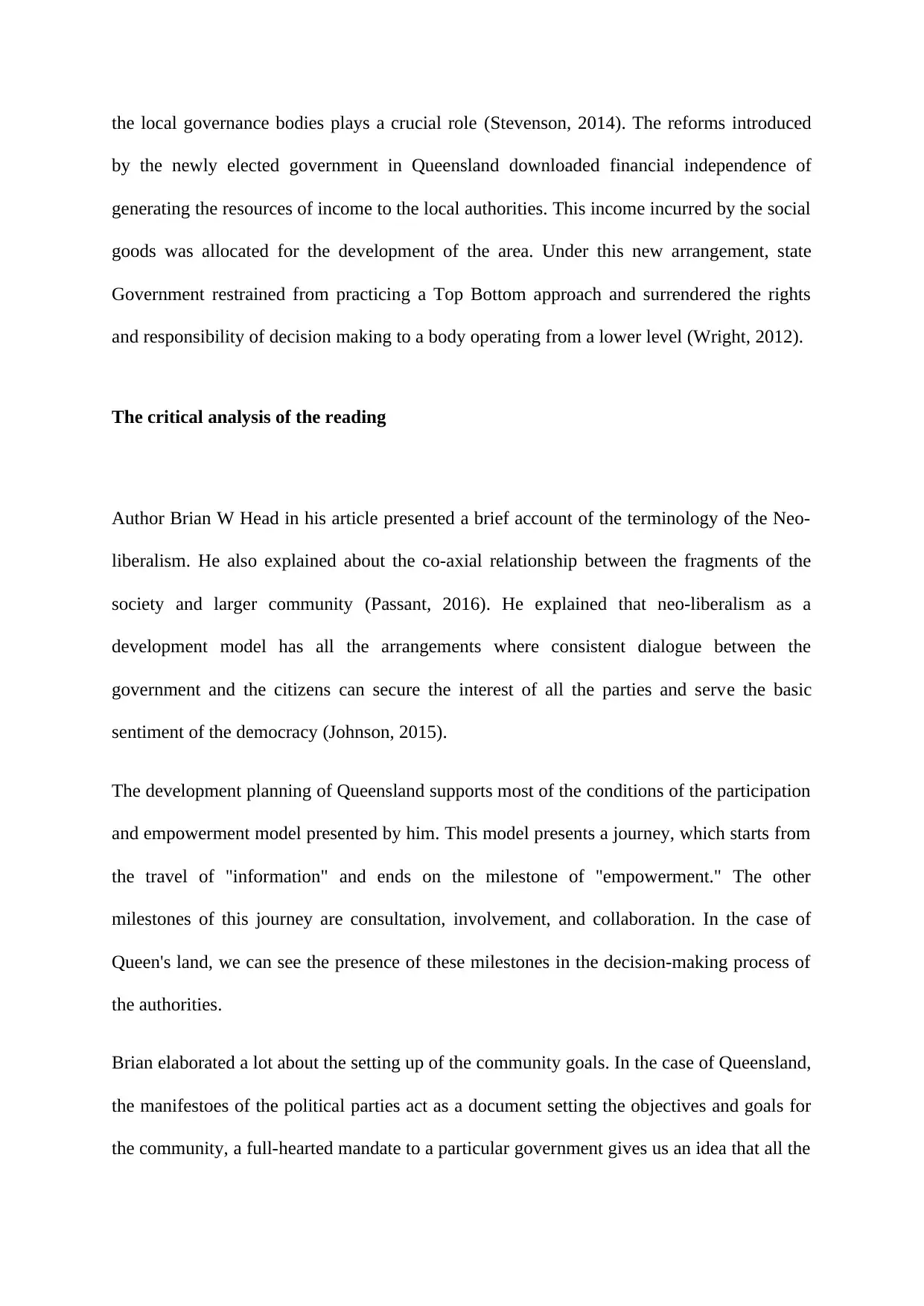
the local governance bodies plays a crucial role (Stevenson, 2014). The reforms introduced
by the newly elected government in Queensland downloaded financial independence of
generating the resources of income to the local authorities. This income incurred by the social
goods was allocated for the development of the area. Under this new arrangement, state
Government restrained from practicing a Top Bottom approach and surrendered the rights
and responsibility of decision making to a body operating from a lower level (Wright, 2012).
The critical analysis of the reading
Author Brian W Head in his article presented a brief account of the terminology of the Neo-
liberalism. He also explained about the co-axial relationship between the fragments of the
society and larger community (Passant, 2016). He explained that neo-liberalism as a
development model has all the arrangements where consistent dialogue between the
government and the citizens can secure the interest of all the parties and serve the basic
sentiment of the democracy (Johnson, 2015).
The development planning of Queensland supports most of the conditions of the participation
and empowerment model presented by him. This model presents a journey, which starts from
the travel of "information" and ends on the milestone of "empowerment." The other
milestones of this journey are consultation, involvement, and collaboration. In the case of
Queen's land, we can see the presence of these milestones in the decision-making process of
the authorities.
Brian elaborated a lot about the setting up of the community goals. In the case of Queensland,
the manifestoes of the political parties act as a document setting the objectives and goals for
the community, a full-hearted mandate to a particular government gives us an idea that all the
by the newly elected government in Queensland downloaded financial independence of
generating the resources of income to the local authorities. This income incurred by the social
goods was allocated for the development of the area. Under this new arrangement, state
Government restrained from practicing a Top Bottom approach and surrendered the rights
and responsibility of decision making to a body operating from a lower level (Wright, 2012).
The critical analysis of the reading
Author Brian W Head in his article presented a brief account of the terminology of the Neo-
liberalism. He also explained about the co-axial relationship between the fragments of the
society and larger community (Passant, 2016). He explained that neo-liberalism as a
development model has all the arrangements where consistent dialogue between the
government and the citizens can secure the interest of all the parties and serve the basic
sentiment of the democracy (Johnson, 2015).
The development planning of Queensland supports most of the conditions of the participation
and empowerment model presented by him. This model presents a journey, which starts from
the travel of "information" and ends on the milestone of "empowerment." The other
milestones of this journey are consultation, involvement, and collaboration. In the case of
Queen's land, we can see the presence of these milestones in the decision-making process of
the authorities.
Brian elaborated a lot about the setting up of the community goals. In the case of Queensland,
the manifestoes of the political parties act as a document setting the objectives and goals for
the community, a full-hearted mandate to a particular government gives us an idea that all the
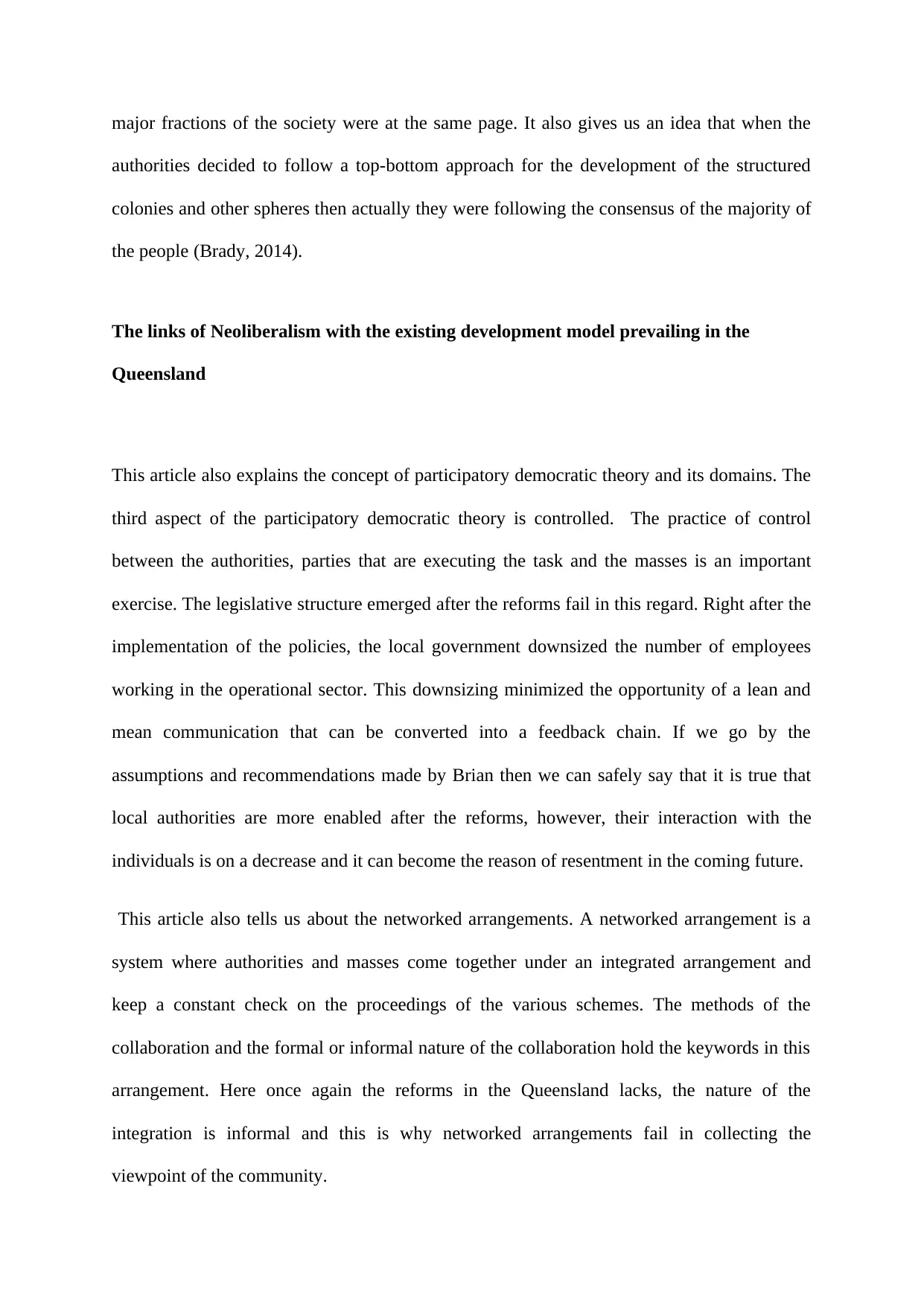
major fractions of the society were at the same page. It also gives us an idea that when the
authorities decided to follow a top-bottom approach for the development of the structured
colonies and other spheres then actually they were following the consensus of the majority of
the people (Brady, 2014).
The links of Neoliberalism with the existing development model prevailing in the
Queensland
This article also explains the concept of participatory democratic theory and its domains. The
third aspect of the participatory democratic theory is controlled. The practice of control
between the authorities, parties that are executing the task and the masses is an important
exercise. The legislative structure emerged after the reforms fail in this regard. Right after the
implementation of the policies, the local government downsized the number of employees
working in the operational sector. This downsizing minimized the opportunity of a lean and
mean communication that can be converted into a feedback chain. If we go by the
assumptions and recommendations made by Brian then we can safely say that it is true that
local authorities are more enabled after the reforms, however, their interaction with the
individuals is on a decrease and it can become the reason of resentment in the coming future.
This article also tells us about the networked arrangements. A networked arrangement is a
system where authorities and masses come together under an integrated arrangement and
keep a constant check on the proceedings of the various schemes. The methods of the
collaboration and the formal or informal nature of the collaboration hold the keywords in this
arrangement. Here once again the reforms in the Queensland lacks, the nature of the
integration is informal and this is why networked arrangements fail in collecting the
viewpoint of the community.
authorities decided to follow a top-bottom approach for the development of the structured
colonies and other spheres then actually they were following the consensus of the majority of
the people (Brady, 2014).
The links of Neoliberalism with the existing development model prevailing in the
Queensland
This article also explains the concept of participatory democratic theory and its domains. The
third aspect of the participatory democratic theory is controlled. The practice of control
between the authorities, parties that are executing the task and the masses is an important
exercise. The legislative structure emerged after the reforms fail in this regard. Right after the
implementation of the policies, the local government downsized the number of employees
working in the operational sector. This downsizing minimized the opportunity of a lean and
mean communication that can be converted into a feedback chain. If we go by the
assumptions and recommendations made by Brian then we can safely say that it is true that
local authorities are more enabled after the reforms, however, their interaction with the
individuals is on a decrease and it can become the reason of resentment in the coming future.
This article also tells us about the networked arrangements. A networked arrangement is a
system where authorities and masses come together under an integrated arrangement and
keep a constant check on the proceedings of the various schemes. The methods of the
collaboration and the formal or informal nature of the collaboration hold the keywords in this
arrangement. Here once again the reforms in the Queensland lacks, the nature of the
integration is informal and this is why networked arrangements fail in collecting the
viewpoint of the community.
⊘ This is a preview!⊘
Do you want full access?
Subscribe today to unlock all pages.

Trusted by 1+ million students worldwide
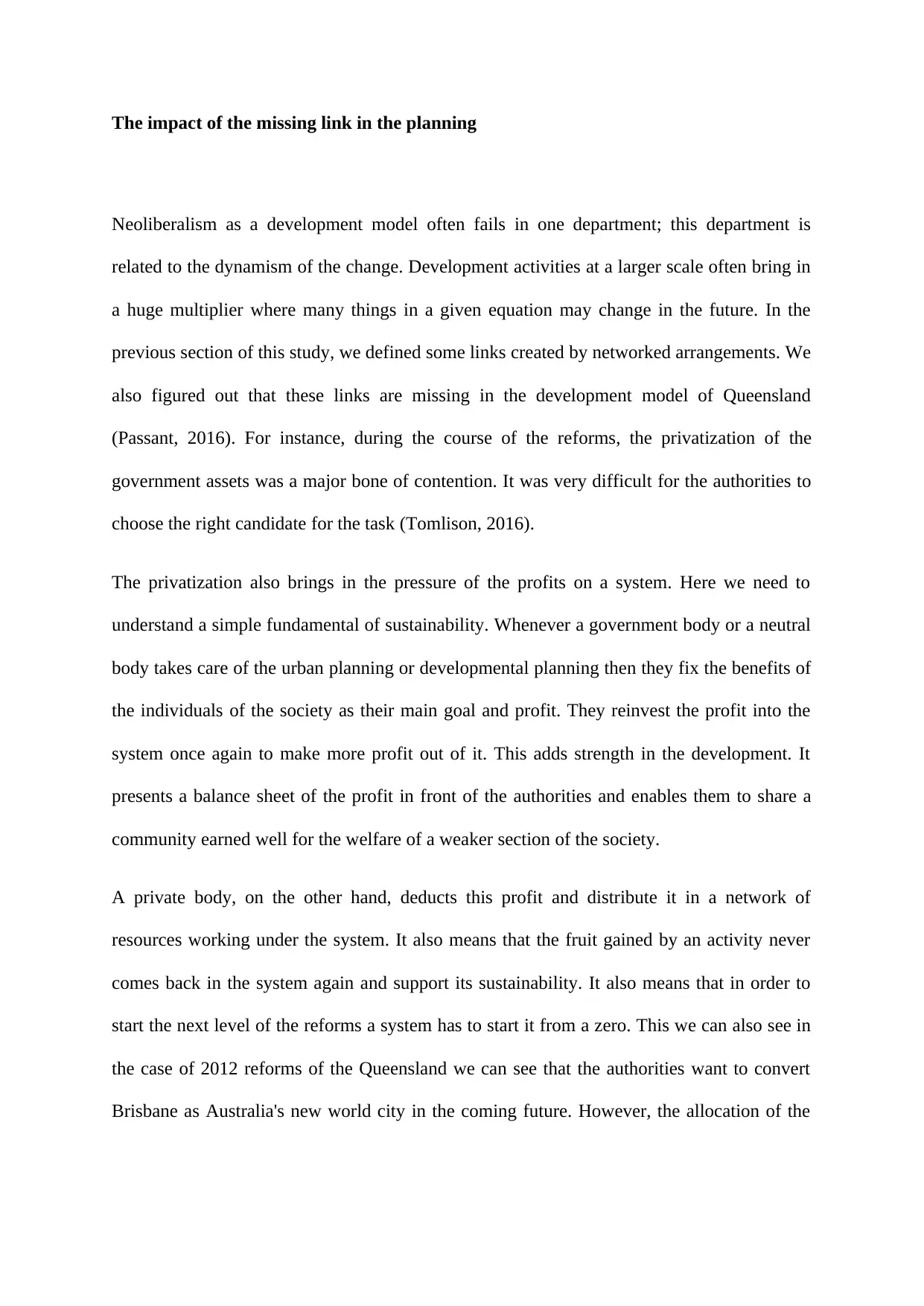
The impact of the missing link in the planning
Neoliberalism as a development model often fails in one department; this department is
related to the dynamism of the change. Development activities at a larger scale often bring in
a huge multiplier where many things in a given equation may change in the future. In the
previous section of this study, we defined some links created by networked arrangements. We
also figured out that these links are missing in the development model of Queensland
(Passant, 2016). For instance, during the course of the reforms, the privatization of the
government assets was a major bone of contention. It was very difficult for the authorities to
choose the right candidate for the task (Tomlison, 2016).
The privatization also brings in the pressure of the profits on a system. Here we need to
understand a simple fundamental of sustainability. Whenever a government body or a neutral
body takes care of the urban planning or developmental planning then they fix the benefits of
the individuals of the society as their main goal and profit. They reinvest the profit into the
system once again to make more profit out of it. This adds strength in the development. It
presents a balance sheet of the profit in front of the authorities and enables them to share a
community earned well for the welfare of a weaker section of the society.
A private body, on the other hand, deducts this profit and distribute it in a network of
resources working under the system. It also means that the fruit gained by an activity never
comes back in the system again and support its sustainability. It also means that in order to
start the next level of the reforms a system has to start it from a zero. This we can also see in
the case of 2012 reforms of the Queensland we can see that the authorities want to convert
Brisbane as Australia's new world city in the coming future. However, the allocation of the
Neoliberalism as a development model often fails in one department; this department is
related to the dynamism of the change. Development activities at a larger scale often bring in
a huge multiplier where many things in a given equation may change in the future. In the
previous section of this study, we defined some links created by networked arrangements. We
also figured out that these links are missing in the development model of Queensland
(Passant, 2016). For instance, during the course of the reforms, the privatization of the
government assets was a major bone of contention. It was very difficult for the authorities to
choose the right candidate for the task (Tomlison, 2016).
The privatization also brings in the pressure of the profits on a system. Here we need to
understand a simple fundamental of sustainability. Whenever a government body or a neutral
body takes care of the urban planning or developmental planning then they fix the benefits of
the individuals of the society as their main goal and profit. They reinvest the profit into the
system once again to make more profit out of it. This adds strength in the development. It
presents a balance sheet of the profit in front of the authorities and enables them to share a
community earned well for the welfare of a weaker section of the society.
A private body, on the other hand, deducts this profit and distribute it in a network of
resources working under the system. It also means that the fruit gained by an activity never
comes back in the system again and support its sustainability. It also means that in order to
start the next level of the reforms a system has to start it from a zero. This we can also see in
the case of 2012 reforms of the Queensland we can see that the authorities want to convert
Brisbane as Australia's new world city in the coming future. However, the allocation of the
Paraphrase This Document
Need a fresh take? Get an instant paraphrase of this document with our AI Paraphraser
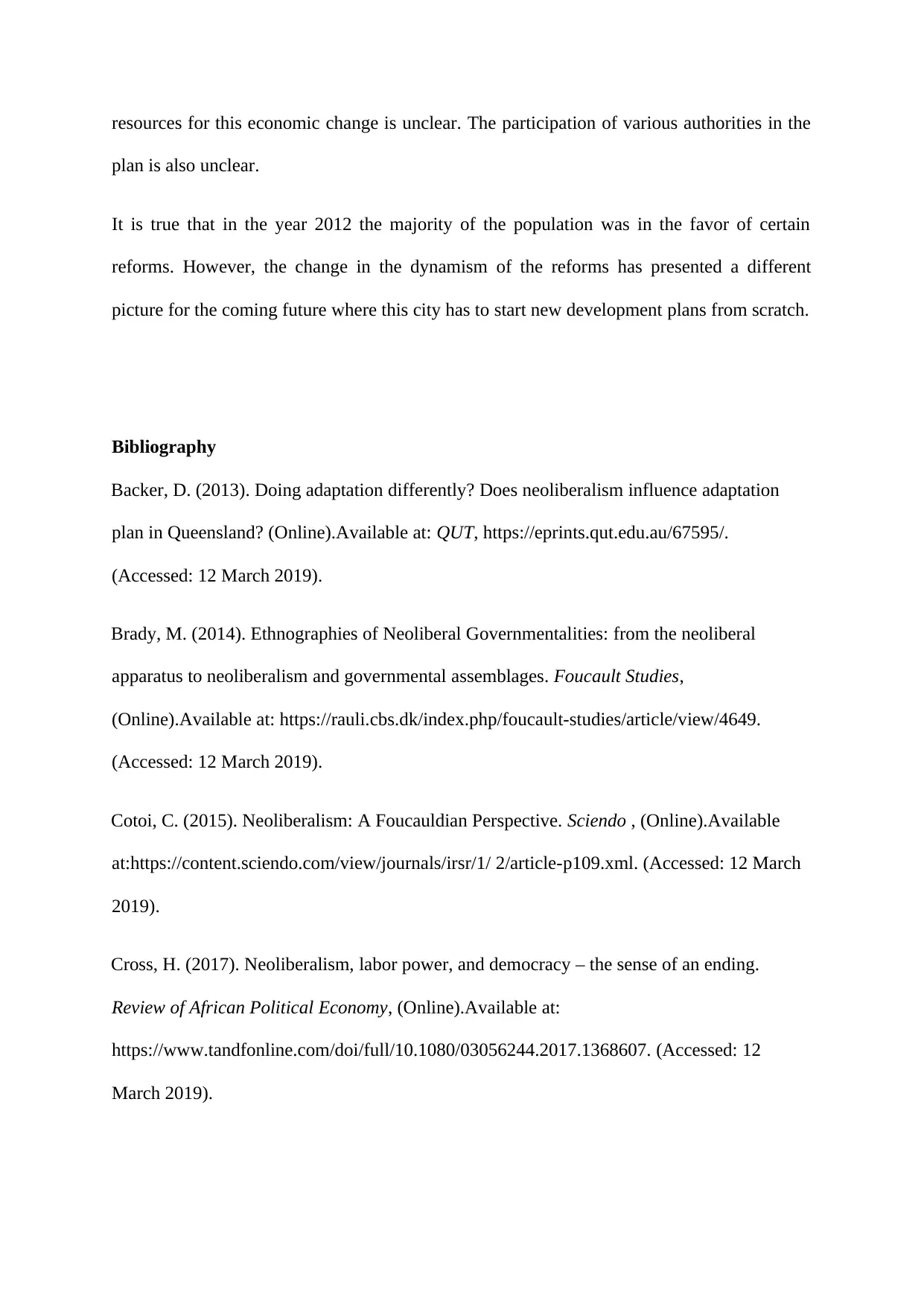
resources for this economic change is unclear. The participation of various authorities in the
plan is also unclear.
It is true that in the year 2012 the majority of the population was in the favor of certain
reforms. However, the change in the dynamism of the reforms has presented a different
picture for the coming future where this city has to start new development plans from scratch.
Bibliography
Backer, D. (2013). Doing adaptation differently? Does neoliberalism influence adaptation
plan in Queensland? (Online).Available at: QUT, https://eprints.qut.edu.au/67595/.
(Accessed: 12 March 2019).
Brady, M. (2014). Ethnographies of Neoliberal Governmentalities: from the neoliberal
apparatus to neoliberalism and governmental assemblages. Foucault Studies,
(Online).Available at: https://rauli.cbs.dk/index.php/foucault-studies/article/view/4649.
(Accessed: 12 March 2019).
Cotoi, C. (2015). Neoliberalism: A Foucauldian Perspective. Sciendo , (Online).Available
at:https://content.sciendo.com/view/journals/irsr/1/ 2/article-p109.xml. (Accessed: 12 March
2019).
Cross, H. (2017). Neoliberalism, labor power, and democracy – the sense of an ending.
Review of African Political Economy, (Online).Available at:
https://www.tandfonline.com/doi/full/10.1080/03056244.2017.1368607. (Accessed: 12
March 2019).
plan is also unclear.
It is true that in the year 2012 the majority of the population was in the favor of certain
reforms. However, the change in the dynamism of the reforms has presented a different
picture for the coming future where this city has to start new development plans from scratch.
Bibliography
Backer, D. (2013). Doing adaptation differently? Does neoliberalism influence adaptation
plan in Queensland? (Online).Available at: QUT, https://eprints.qut.edu.au/67595/.
(Accessed: 12 March 2019).
Brady, M. (2014). Ethnographies of Neoliberal Governmentalities: from the neoliberal
apparatus to neoliberalism and governmental assemblages. Foucault Studies,
(Online).Available at: https://rauli.cbs.dk/index.php/foucault-studies/article/view/4649.
(Accessed: 12 March 2019).
Cotoi, C. (2015). Neoliberalism: A Foucauldian Perspective. Sciendo , (Online).Available
at:https://content.sciendo.com/view/journals/irsr/1/ 2/article-p109.xml. (Accessed: 12 March
2019).
Cross, H. (2017). Neoliberalism, labor power, and democracy – the sense of an ending.
Review of African Political Economy, (Online).Available at:
https://www.tandfonline.com/doi/full/10.1080/03056244.2017.1368607. (Accessed: 12
March 2019).
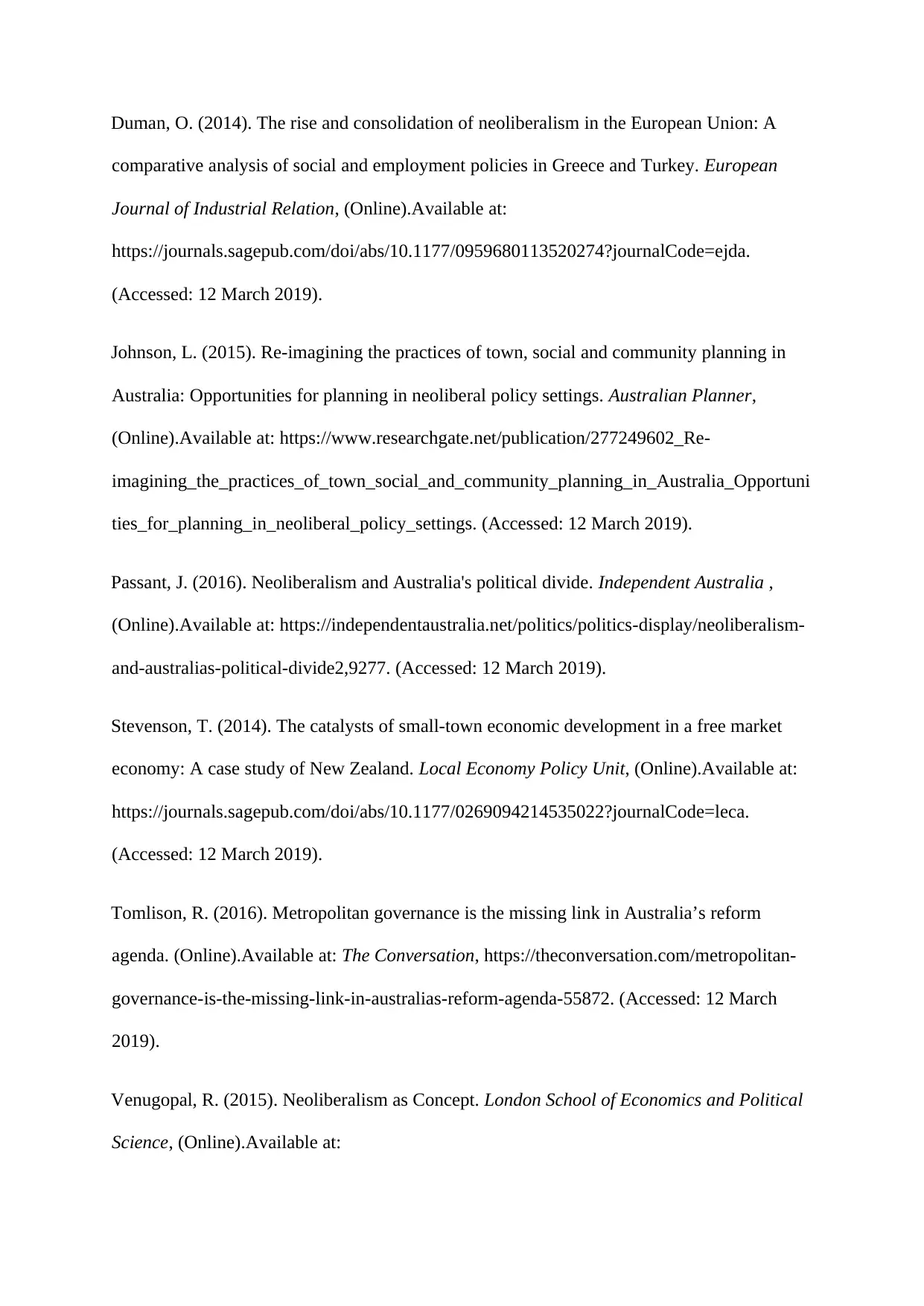
Duman, O. (2014). The rise and consolidation of neoliberalism in the European Union: A
comparative analysis of social and employment policies in Greece and Turkey. European
Journal of Industrial Relation, (Online).Available at:
https://journals.sagepub.com/doi/abs/10.1177/0959680113520274?journalCode=ejda.
(Accessed: 12 March 2019).
Johnson, L. (2015). Re-imagining the practices of town, social and community planning in
Australia: Opportunities for planning in neoliberal policy settings. Australian Planner,
(Online).Available at: https://www.researchgate.net/publication/277249602_Re-
imagining_the_practices_of_town_social_and_community_planning_in_Australia_Opportuni
ties_for_planning_in_neoliberal_policy_settings. (Accessed: 12 March 2019).
Passant, J. (2016). Neoliberalism and Australia's political divide. Independent Australia ,
(Online).Available at: https://independentaustralia.net/politics/politics-display/neoliberalism-
and-australias-political-divide2,9277. (Accessed: 12 March 2019).
Stevenson, T. (2014). The catalysts of small-town economic development in a free market
economy: A case study of New Zealand. Local Economy Policy Unit, (Online).Available at:
https://journals.sagepub.com/doi/abs/10.1177/0269094214535022?journalCode=leca.
(Accessed: 12 March 2019).
Tomlison, R. (2016). Metropolitan governance is the missing link in Australia’s reform
agenda. (Online).Available at: The Conversation, https://theconversation.com/metropolitan-
governance-is-the-missing-link-in-australias-reform-agenda-55872. (Accessed: 12 March
2019).
Venugopal, R. (2015). Neoliberalism as Concept. London School of Economics and Political
Science, (Online).Available at:
comparative analysis of social and employment policies in Greece and Turkey. European
Journal of Industrial Relation, (Online).Available at:
https://journals.sagepub.com/doi/abs/10.1177/0959680113520274?journalCode=ejda.
(Accessed: 12 March 2019).
Johnson, L. (2015). Re-imagining the practices of town, social and community planning in
Australia: Opportunities for planning in neoliberal policy settings. Australian Planner,
(Online).Available at: https://www.researchgate.net/publication/277249602_Re-
imagining_the_practices_of_town_social_and_community_planning_in_Australia_Opportuni
ties_for_planning_in_neoliberal_policy_settings. (Accessed: 12 March 2019).
Passant, J. (2016). Neoliberalism and Australia's political divide. Independent Australia ,
(Online).Available at: https://independentaustralia.net/politics/politics-display/neoliberalism-
and-australias-political-divide2,9277. (Accessed: 12 March 2019).
Stevenson, T. (2014). The catalysts of small-town economic development in a free market
economy: A case study of New Zealand. Local Economy Policy Unit, (Online).Available at:
https://journals.sagepub.com/doi/abs/10.1177/0269094214535022?journalCode=leca.
(Accessed: 12 March 2019).
Tomlison, R. (2016). Metropolitan governance is the missing link in Australia’s reform
agenda. (Online).Available at: The Conversation, https://theconversation.com/metropolitan-
governance-is-the-missing-link-in-australias-reform-agenda-55872. (Accessed: 12 March
2019).
Venugopal, R. (2015). Neoliberalism as Concept. London School of Economics and Political
Science, (Online).Available at:
⊘ This is a preview!⊘
Do you want full access?
Subscribe today to unlock all pages.

Trusted by 1+ million students worldwide
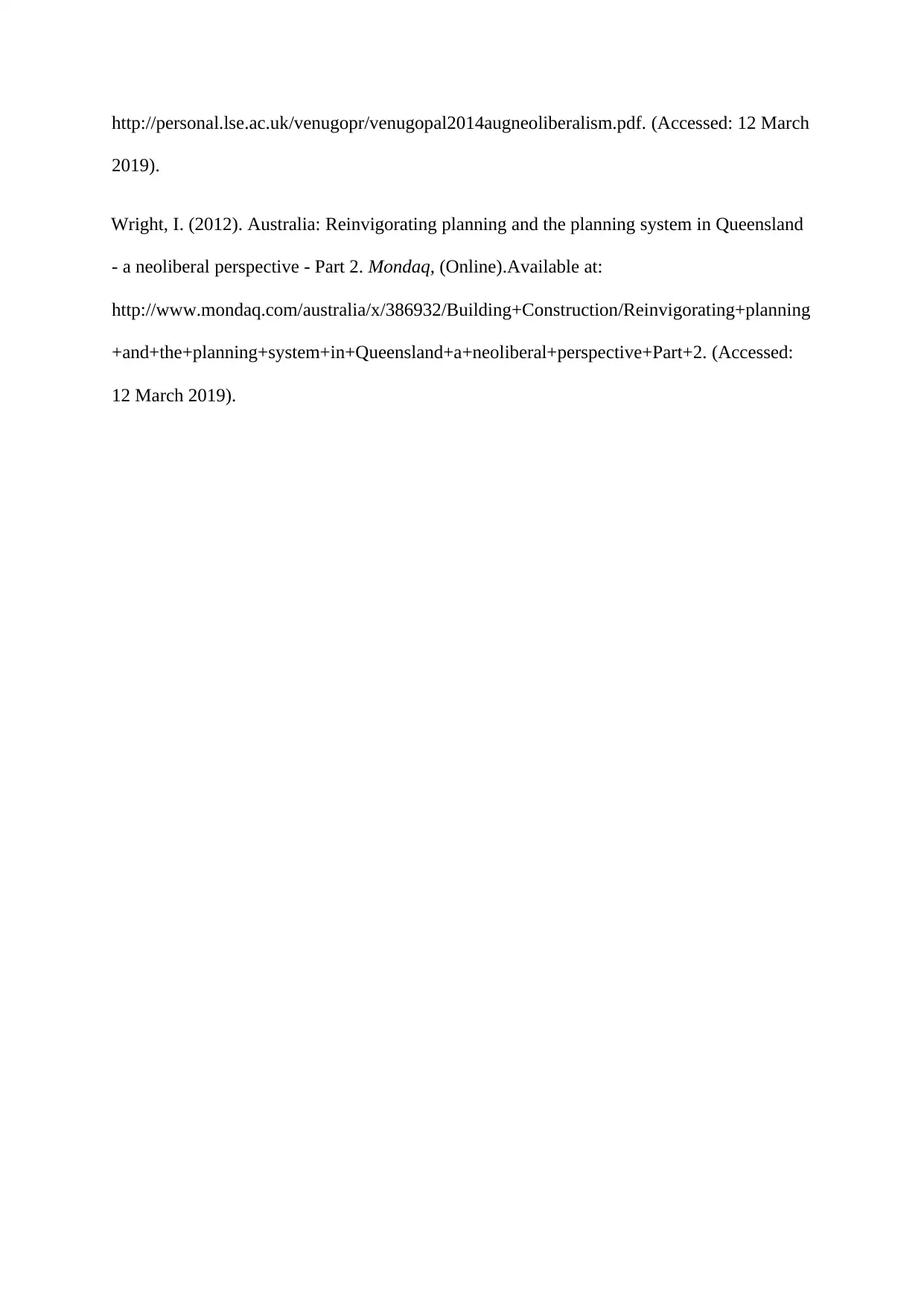
http://personal.lse.ac.uk/venugopr/venugopal2014augneoliberalism.pdf. (Accessed: 12 March
2019).
Wright, I. (2012). Australia: Reinvigorating planning and the planning system in Queensland
- a neoliberal perspective - Part 2. Mondaq, (Online).Available at:
http://www.mondaq.com/australia/x/386932/Building+Construction/Reinvigorating+planning
+and+the+planning+system+in+Queensland+a+neoliberal+perspective+Part+2. (Accessed:
12 March 2019).
2019).
Wright, I. (2012). Australia: Reinvigorating planning and the planning system in Queensland
- a neoliberal perspective - Part 2. Mondaq, (Online).Available at:
http://www.mondaq.com/australia/x/386932/Building+Construction/Reinvigorating+planning
+and+the+planning+system+in+Queensland+a+neoliberal+perspective+Part+2. (Accessed:
12 March 2019).
1 out of 10
Your All-in-One AI-Powered Toolkit for Academic Success.
+13062052269
info@desklib.com
Available 24*7 on WhatsApp / Email
![[object Object]](/_next/static/media/star-bottom.7253800d.svg)
Unlock your academic potential
Copyright © 2020–2026 A2Z Services. All Rights Reserved. Developed and managed by ZUCOL.
